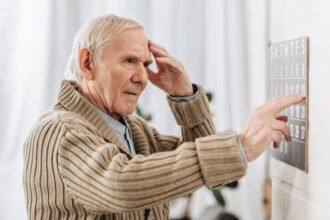It’s hard to see your loved one’s change their behavior because of dementia. Sometimes, it seems that there’s nothing left from the person you knew, but you have to be strong and prepare yourself for this situation as much as you can.
As this is a completely new territory for both sides, it’s going to take a time until you catch up with this situation and do what’s best for them. You have to educate yourself and maintain a positive, but realistic attitude. Nevertheless, you can always ask others for advice or help. These pieces of advice could be helpful if you find yourself having to look after a person with dementia, .
Symptoms of dementia
As you may know, dementia includes all sorts of symptoms, depending on the areas of the brain that are affected by the disease. Memory loss is the most apparent symptom, but dementia could also include a change in behavior and mood, hallucinations and delusions. In the latest stages, the disease could prevent people from doing routine daily activities such as using the toilet and dressing independently. Dementia usually attacks older people for a number of reasons. Some of them may also have a problem with osteoporosis, anxiety, agitation, hearing problems, weak eyesight, paralysis, etc. You have to understand that they are feeling vulnerable, so be patient with them.
Good and bad days
The truth is that people with dementia will sometimes act normally, but sometimes they will become aggressive out of the blue. When that happens, try to remain calm and put yourself in their shoes. They are not doing it on purpose – they are just scared and don’t know how to voice their feelings.
It’s important to talk with them in a low, calming voice. Arguing and telling them “no” is the worst option, so avoid this kind of behavior. You should try to find the cause of their aggression, but in some situation, you will just have to give them a bit of space.
Nevertheless, you have to be realistic. Most types of dementia are progressive and irreversible. Your job is to make people with dementia feel as safe and happy as possible. Every day is a new challenge, so try to foster the good days and moments for them.
Carer support groups
Caregiving for someone with dementia is not easy, but it’ easier if you can discuss your problems with someone. Supporting groups are a great place to learn about the disease and to see what others are going through. More experienced caregivers or professionals are always ready to answer all of your questions. That is important when you are facing an exceptional challenge or difficult time. On the other hand, with so many obligations on your back, you will sometimes need a help of a professional. Don’t judge yourself because you don’t have enough time. Sometimes you will have to work long hours or have to take care of your kids. In this situation, the best option is to get them to a great dementia care center like newdirectioncare, because that way you’ll be able to visit them whenever you can, and you’ll know that professionals are giving them everything they need.
When to call a doctor?
If you choose to take care of a person with dementia on your own, it’s important to recognize the signs that you need help. So, if you notice signs of delirium, such as confusion or emotional outbursts, or if a person doesn’t seem to know where or who they are, it’s time to call a doctor.
Next, call a doctor if signs of a stroke or transient ischemic attack (TIA) develop suddenly. The symptoms may include weakness, especially on one side of the body, eye problems, confusion, dizziness, headache, etc. New and troubling memory loss could indicate the progress of the disease. If a person with dementia has trouble finding the right words when speaking, getting lost going to familiar places, and acting suspiciously, you should report these changes in behavior to the doctor.
Dementia will start slowly, but it will progress. You will meet many professionals and you should think about them as a part of your team. If you don’t understand what doctors are saying, ask them again. Remember, staying calm and patient is of utmost importance.









